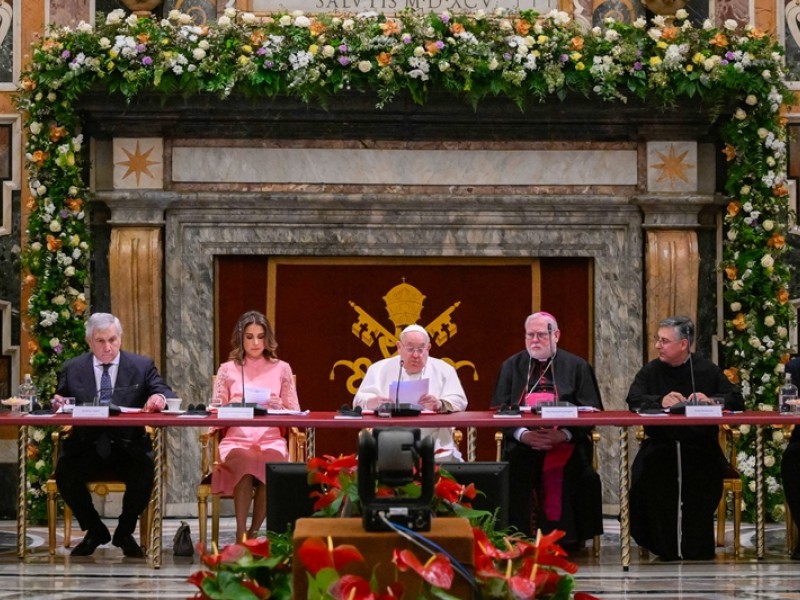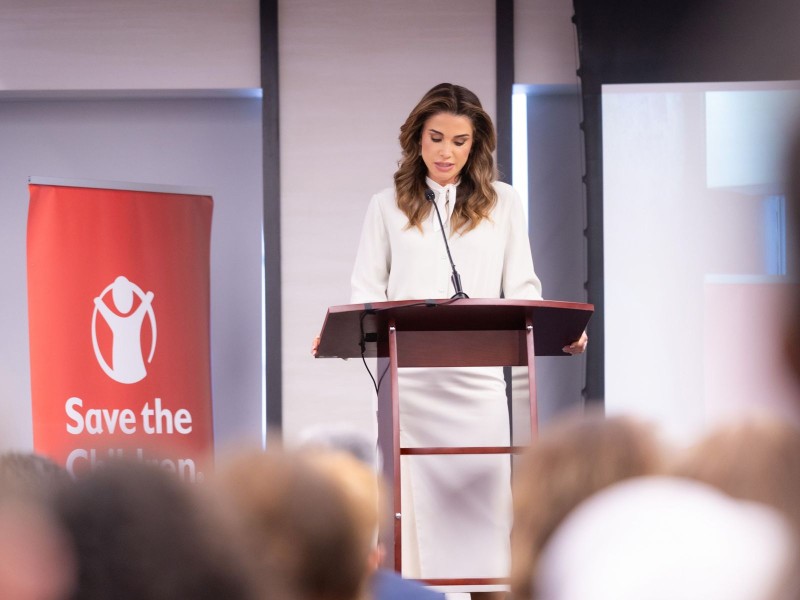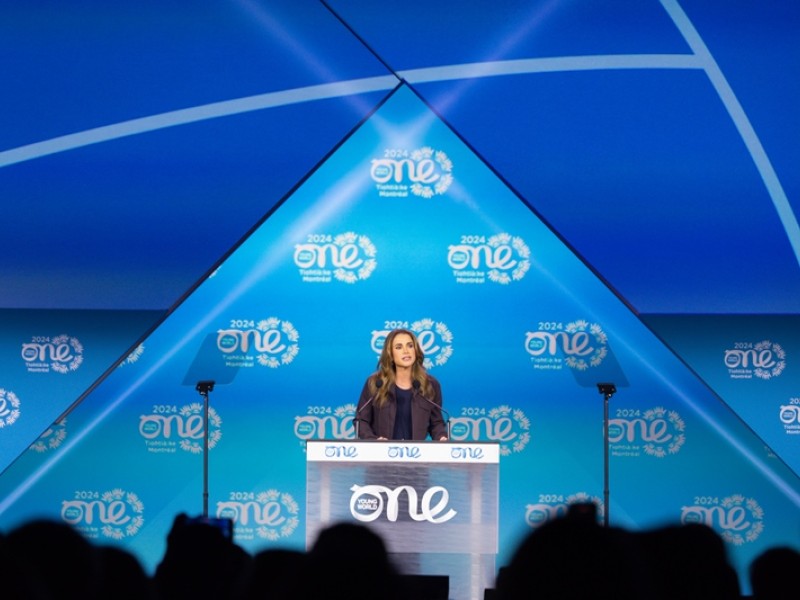Queen Rania's Speech at WEF Global Redesign Summit - Doha, Qatar
We realize that a key indicator of human advancement is education
صاحب السمو الأمير حمد بن خليفة آل ثاني،،
السيد البروفيسور كلاوس شواب،،
شركائي في المسؤولية و الواجب الإنساني الحضور الكريم،،،
السلام عليكم و رحمة الله و بركاته،،
إنه لمن دواعي فخري بأن تكون محطة التغيير هذا العام لهذا التجمع العالمي الفاعل في دولة عربية، دولة قطر الشقيقة. فهي بالإضافة إلى كونها فرصة لدول العالم للوقوف و محاسبة النفس على مدى المشاركة في حل القضايا التي تؤثر على البشرية جمعاء، هي أيضا فرصتنا نحن العرب لنشارك في حوار عالمي، و لنضع بصمتنا على عصر يشهد تغييرات و مستجدات تؤثر على الإنسانية قاطبة. فشكرا لقيادة قطر على رؤيتها و رعايتها لمبادرة إعادة التصميم الشامل، و استضافتها مؤتمر قمتها في دولة قطر الشقيقة.
And, thank you, Klaus.
None of us would be here if it weren’t for your vision and leadership. Your ability to mobilize not just people, but the best in people, has pulled together possibly the largest and most talented collection of experts the world has ever seen… a group able to draw on a wide reservoir of thought and perspective – exactly what we need for the job in hand.
Someone once said, “Justice is the conscience of humanity.”
When I look at the world today, I fear we aren’t listening to our conscience, because I don’t see justice.
I see Mohammed, an 80 year old herdsman from Somalia who lost his entire livestock and livelihood to climate change.
I see Devli, a 7 year old Indian girl who’d carried sharp, heavy stones for 20 hours a day ever since she could walk.
I see Franca, a 32 year old from Florida, university educated, forced into joblessness, homelessness, and poverty by the financial crisis.
Now multiply these stories by hundreds of millions. Because that’s how many people are suffering from extreme weather, child labour, and so many other unjust crises where the burden falls upon the innocent.
Mohammed, Devli, and Franca are found on every continent. Their names differ, but their stories are the same: human suffering; our humanity suffering.
This glaring injustice… inequality… imbalance dominates our world. It pushes us to a place where international deadlock is the norm, where cynicism and mistrust are common currency.
It builds a society around erroneous assumptions that tell us if just enough people are happy, then there’s no need to change it.
But just enough isn’t good enough.
For every day this continues, billions of people are at risk from poverty, disease, conflict, and climate change. Permanent scars are left on the minds and bodies of our children. Irreversible damage is done to the air, land, and seas of our grandchildren.
And let me be clear, no country is left untouched by the inequality of the international system.
Developed countries suffered nearly half of all global job losses, yet they make up less than a fifth of the global workforce.
So, let me ask you this:
What does it say about our humanity, when we let 9 million children die every year before the age of 5?
What does it say about our integrity, when we break our promises to put 72 million children into primary school?
What does it say about our morality, when we abandon over 600 million adolescent girls to poverty and prejudice?
To me, it says international injustice is the symptom of a broader crisis: an international crisis of values.
Because, when the bottom line becomes our guiding principle, we know that financial value trumps human value.
When we live in an unjust system, it becomes just a system. A system without values.
Our world craves values; these fundamental human instincts, like compassion for the vulnerable, charity, forgiveness, and prizing peace over conflict.
They’re what Kevin McCabe calls the “currency of grace”. A currency “based on the gold standard that every human has value”; that they’re deserving of respect, dignity, and opportunity, because the only value is human value.
Over the coming days and months, I want you to keep this front and centre.
Because, we need these human values to drive the discourse of the World Economic Forum.
We need WEF to remember what Warren Buffet refers to as “value investing”, where you invest in the undervalued because you recognize their potential.
Well, right now we need to start investing in our values! We need to start investing in the undervalued, like the poor and uneducated, and recognize their potential.
And that’s why you’re here: to restore human values… to restore our conscience … to restore justice to the system… so that our children don’t have to live with our mistakes or become destined to repeat them.
And that’s why the Global Redesign Initiative is so important.
We need WEF’s experience to navigate today’s complex world, a world so interdependent that a fire in one part burns us all.
We need to step outside our bubble, where leadership, government, and industry reside and rotate through the proverbial revolving door.
We need to be inclusive, and recognize that solutions must include opinions and ideas from developing countries, the private sector, NGOs, and youth. Even when you don’t like what they’re saying, you have to be strong enough to listen, to give voice to the indigenous and indigent instead of deferring to profit.
And, we need to ask the tough question: do we really represent others, or are we after our own narrow self interest?
Which is why now is the time to rebuild the system; now is the time to confront the rising challenges of our age.
The size of our task should not daunt us. The solutions exist.
They’re in the schools of Finland, which produce the best students; the hospitals of Canada, which provide the best care; and, the parliament of Rwanda, which has the most women.
They’re in the projects of brave NGOs and the minds of groundbreaking social entrepreneurs.
Our religions tell us we are only as strong as our weakest link; that we should respect strength, not power. If we truly want reform, we need the strength to challenge our definitions of progress, and our assumptions about the world.
We need to remind ourselves that economic prosperity in itself is only a means to an end, not an end in itself.
So, as we survey the landscape and see extreme poverty, violence, persecution, and pain, we know that these indicators are what define our world today. And it’s these indicators a new system should focus on, because the MDGs are just as important as GDP.
And when we begin to see the world through a different lens, through a human lens…
When we start to hold the currency of grace, believing there should be no economic value without human value…
We realize that a key indicator of human advancement is education… how many children are in school… the quality of education of every child.
Because, our schools are incubators for the world we want to create; they’re microcosms of our future in the making.
Because, it’s in the classroom we’ll beat poverty.
It’s in the classroom we’ll defeat terrorism.
It’s in the classroom we’ll steep our students in the principles that will save our planet.
Most of all, it’s in the classroom we’ll teach our children to defend themselves against the misguided and malicious beliefs of others.
In the long run, only education can bring about a new world order, only education can make “redesign” a truly global initiative.
So your task is not just to rethink, redesign, and rebuild the international system; but to revalue human values, restore them to public life, and remind the world how much humanity needs them.
So, let us listen to our conscience once more; let us return justice to humanity.
Thank you.
Featured
Queen Rania's official website
This website does not support old browsers. To view this website, Please upgrade your browser to IE 9 or greater
Your browser is out of date. It has known security flaws and may not display all features of this and other websites. Learn how to update your browser



